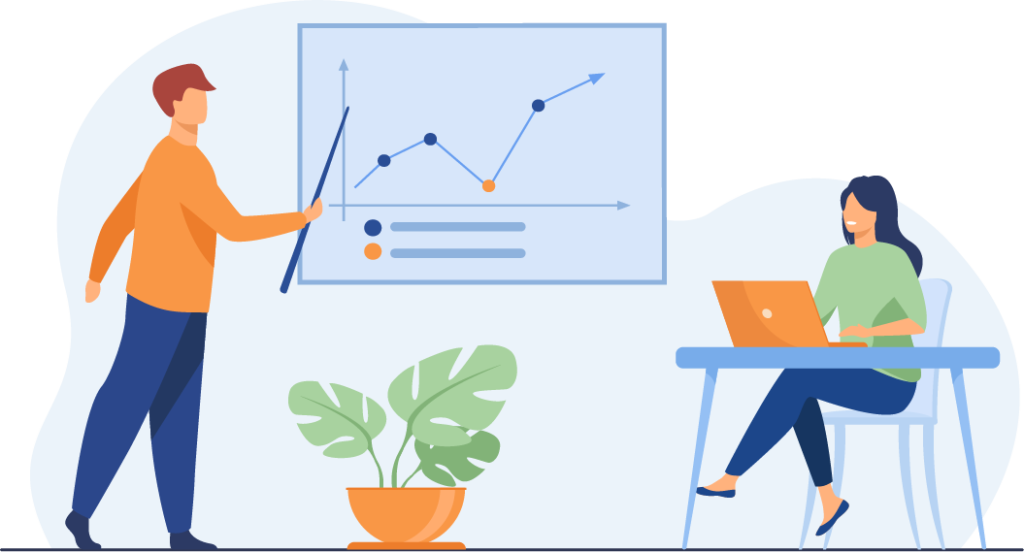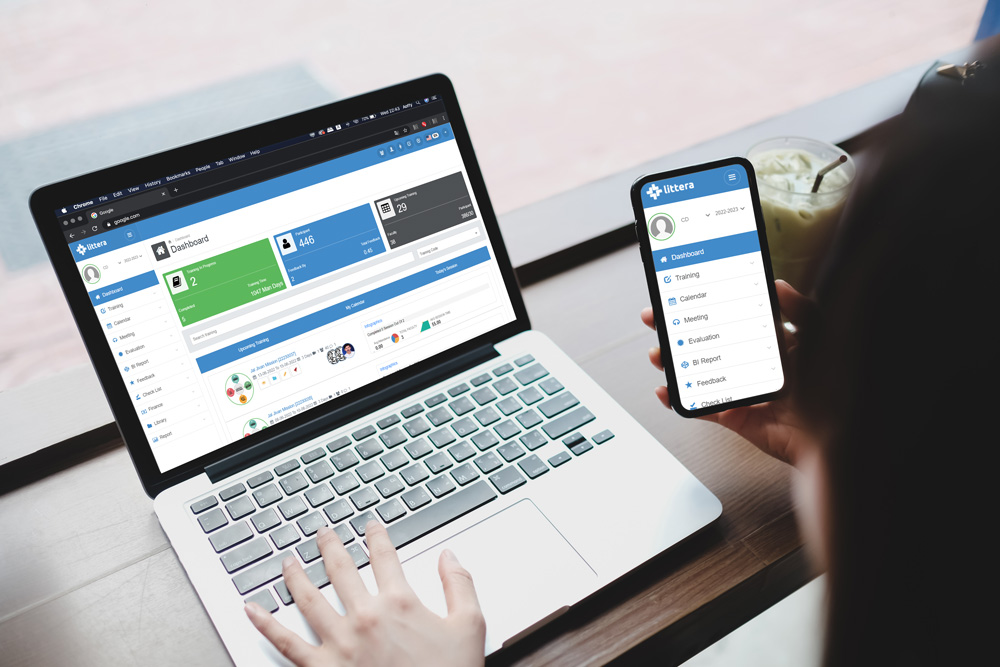Employees nowadays are looking for work that would give them meaning and allow them to grow. But there’s another side to this equation. They do not simply seek ongoing employee training for NGOs, they require it.
Managers who can help employees relate their meaning to the work they do every day, and even better, to the corporate objective, will be tapping into the most powerful source of inspiration. “The greatest motivator for both impact and fulfillment is purpose.”

Employee Training
Employee training and development is a program that assists employees in learning certain skills as well as knowledge to increase their performance and productivity in their present job role. It also improves future performance and assists in focusing on greater staff growth.
Companies that implement an effective training and development program can retain more staff, increase profitability, and have more engaged employees. Furthermore, it assists the organization in avoiding the costs associated with talent loss. Training and developing an employee not only helps them grow but also helps the organization grow. Similarly, it lets employees feel that they are appreciated in the organization.
Training and development have evolved as critical components of strategy in recent years. Business owners are realizing that investing in employee training and development not only motivates employees but also allows the organization to generate a highly trained workforce.
Whether you already have a training program you’re looking to improve, or you’re aiming to implement one, Littera Learning Platform has all the ingredients required to make an employee training program successful.
Why are training platforms necessary for nonprofit organizations? It’s because NGOs employ diverse groups of people across the nation or world, including board members, volunteers, and full-time employees. How can you guarantee that knowledge is accessible through a single, unified platform? An online platform accessible from any location is the only practical solution.
When you’re short on time and money, you can choose the Littera platform, which offers tools designed specifically for NGOs. These tools offer a cost-effective solution that enables you to deliver training without using up all of your internal resources. With Littera’s top tools, you can easily create and assign courses, monitor progress, automate communications, and improve learning and grow your organization.
Why Employee Training Program is Important?
Training programs are essential for a range of reasons. First, they equip non-governmental organizations with the skills and information they need to accomplish their jobs effectively.
Second, they assist in keeping the organization’s team members informed about new procedures, goods, and processes.
Third, training programs can enhance employee morale and motivation by providing them with a sense of mastery and accomplishment. Finally, well-designed training programs can help to reduce turnover and increase retention.
Training programs, in other words, are critical for both individual and organizational success. When done correctly, they can have a significant impact on productivity, sustainability, and satisfaction.
Not all training programs, however, are made equal. A training program must be well-designed and effectively implemented in order to be effective. It should also be adjusted to the unique organization’s and its employees’ demands.
There are a few things to consider before launching a training program at your organization. Begin by defining the program’s objectives. What are you hoping to learn? How would this understanding help them perform their tasks more effectively? After you’ve answered these questions, you can start planning a program to help you attain your full potential.
Remember that an excellent training program is an investment in the future of your organization. When done correctly, it can pay you handsomely.

Flexible Sessions
Littera is highly flexible and can be tailored to fit the needs of individual learners. Whether it’s through short videos, interactive quizzes, or other engaging formats, microlearning makes it easy for people to learn on their terms.
The Flexible Sessions of Littera microlearning represent the future of worker capacity building. Littera encourages learners to take control of their learning path by breaking free from the restrictions of traditional education and embracing innovative multimedia formats. This novel method not only creates a greater comprehension of the subject matter but also fosters a sense of autonomy and motivation, ultimately revolutionizing the way people develop professionally.
Lean
A good leader is someone who can inspire and motivate team members to work toward a common goal. They don’t need a group to implement the program.
Group dynamics gets into the complex interplay of human features and functions, producing a range of results. The balance of these results is dependent on effective relationships, clear communication, and goal alignment. Finding the ideal number of members in the context of program implementation is a strategic decision that affects the group’s overall efficacy. We unlock the potential for transforming experiences and accomplishments by studying and exploiting the dynamics of distinct groups.


Adaptable
When it comes to implementing a program, it’s important to have a clear plan in place and to communicate that plan effectively to all team members. It could be applied to many staff from various departments and locations.
This signifies a paradigm leap in our approach to staff training. We use it in a future where learning is a dynamic and personalized experience by abandoning the traditional one-size-fits-all approach. With the help of Littera, this method becomes more accessible and successful for growing employee capacity across departments and locations, ushering in a more empowered and adaptable workforce.
Simple
By breaking down complex topics into bite-sized pieces, Littera allows learners to focus on one concept at a time without feeling overwhelmed.
Users in a new manner of learning that is in sync with the rhythms of daily life. Littera’s strategic design blurs the lines between devices and situations, allowing learners to access knowledge whenever and wherever they want. Not only does this improve the learning experience, but it also empowers individuals to become architects of their own intellectual advancement, all from the palm of their hand.


Seamless
A successful Littera involves only 10-15 minutes of your employees’ time and is ideal for mobile devices, laptops, and desktop consumption. As a result, employees can learn new in small portions every day until learning becomes a habit that they practice effortlessly.
Learning via Littera microlearning raises the bar for personalized, efficient, and engaging education. Learners with various schedules and attention spans find an oasis of information that supports their growth path, thanks to a variety of forms and a focus on specific objectives. Littera microlearning not only respects time constraints but also turns them into an asset for personal and professional development.
Assessments
A performance evaluation is a structured process of evaluating an employee’s pre and post-training performance against established employment expectations. It entails a subjective assessment of the individual’s strengths and areas for development, as well as their value to the organization and potential for future growth and development.
Learning via Littera microlearning raises the bar for personalized, efficient, and engaging education. Learners with various schedules and attention spans find an oasis of information that supports their growth path, thanks to a variety of forms and a focus on specific objectives. Littera microlearning not only respects time constraints but also turns them into an asset for personal and professional development.


Collaboration
The messaging system allows for quick communication and easy access to information, while the discussion boards provide a space for more in-depth conversations and brainstorming sessions. With these tools at their disposal, workers can stay connected and engaged no matter where they are located or what their schedules look like.
Collaboration and interactivity in Littera modules usher in a new era of employee training. Littera empowers individuals to flourish in a dynamic and ever-changing landscape by encouraging participation, applying knowledge to real-world circumstances, and allowing employees to take responsibility for their learning.
Multimedia options
Littera entails limited learning time, activities that are focused on the short term, and relatively minimal learning elements. we offer a variety that allows you to seamlessly integrate images, videos, and audio files into your training materials. Whether you’re looking to create interactive e-learning modules or simply enhance your existing content.
Littera’s embracing of multimedia choices reshapes the learning landscape. Littera transforms the learning experience from ordinary to impactful by supporting different learning styles and incorporating real-life imagery and scenarios. As learners embark on a multifaceted educational journey, they gain the ability to apply newly acquired knowledge with accuracy and confidence, causing a revolutionary ripple effect in their workplace and beyond.


Easy access
The addition of microlearning into an employee learning journey will aid in the long-term engagement of employees, hence increasing employee retention and decreasing attrition.
Littera’s adaptable approach to learning redefines it. It provides bite-sized, relevant content tailored to individual needs, making learning both convenient and practical. Littera transforms learning by offering a customizable and user-friendly experience. Dive into bite-sized, focused content tailored to your unique needs, making learning a breeze. With Littera, you may experience the power of personalized learning.
Professional development
People want to expand their knowledge and abilities in all aspects of their lives. And with the rise of online courses and resources, it’s easier than ever to access information and develop new skills. The benefits of learning are numerous – from increased job opportunities and earning potential to improved cognitive function and overall well-being.
Littera offers a gateway to lifelong learning. In today’s digital era, access to knowledge and skill enhancement is at your fingertips. Our service taps into the benefits of continuous learning, from unlocking career prospects and higher earnings to boosting cognitive prowess and holistic well-being. Embark on a journey of growth with Littera.


Reporting
The reports make it easy for users to quickly find the information they need without having to sift through irrelevant data. The report widgets are also customizable, allowing users to choose which reports they want to see and how they want them displayed.
Littera simplifies data retrieval with meticulously crafted reports. Say goodbye to information overload as our customizable report widgets enable users to tailor their view, accessing relevant data seamlessly. Experience the power of efficient information management with Littera’s Reporting Service.
FAQ (Frequently Asked Questions)
How do NGOs and Non-Profit sectors train their employees?
NGOs and non-profit organizations rely heavily on their employees to achieve their missions, and providing them with the necessary skills and knowledge is crucial to their success.
Employee training can take many forms, from workshops and seminars to online courses and on-the-job training. The focus of the training can vary depending on the organization’s needs, but common areas include leadership development, fundraising strategies, project management, and communication skills. By investing in employee training, NGOs and non-profits can improve staff retention rates, increase productivity, and ultimately achieve greater impact in their communities.
Why is training management & monitoring so crucial for the non-profit sector?
Training management ensures that the resources of the organization are used properly. Employees can develop the skills needed to carry out their jobs properly with good training, which ultimately helps the organization and its beneficiaries.
Monitoring, on the other hand, enables for early detection of possible problems and allows for required adjustments to be made before problems grow. Furthermore, training and monitoring contribute to organizational accountability by ensuring that staff satisfy defined standards.
Why Choose Littera for Employee Training for NGOs and Non-profit Sector?
When it comes to implementing an employee training program, it’s important to have a clear plan in place and to communicate that plan effectively to all team members.
Littera can help ensure that everyone is on the same page and working towards the same goals. This includes individuals with technical expertise, as well as those with strong communication or project management skills.
What is Employee Training for NGOs and Development?
Employee training and development is a program that helps in mastering specific abilities as well as information to expand their exhibition and efficiency in their current work job. It also works on future execution and aids in focusing on more significant personnel development.
What are the benefits of Employee Training for NGOs and Development?
By working together and staying focused on the end goal, even a small team can achieve great things. it is important to note that leadership does not necessarily mean dictating every aspect of the classroom.
This involves creating a positive and supportive work environment where everyone feels valued and respected.
Types of Employee Training for NGOs and Development?
Employees joining a large corporation are required to participate in mandatory onboarding activities. Implementing employee training for individual firms vary in many ways, including corporate objective, employee size, and the types of activities included in training programs.
There are a few types of training available:
- Technical skill development
- Soft skill development
- Quality training
- Safety training
- Leadership and managerial training
- Mental health training

